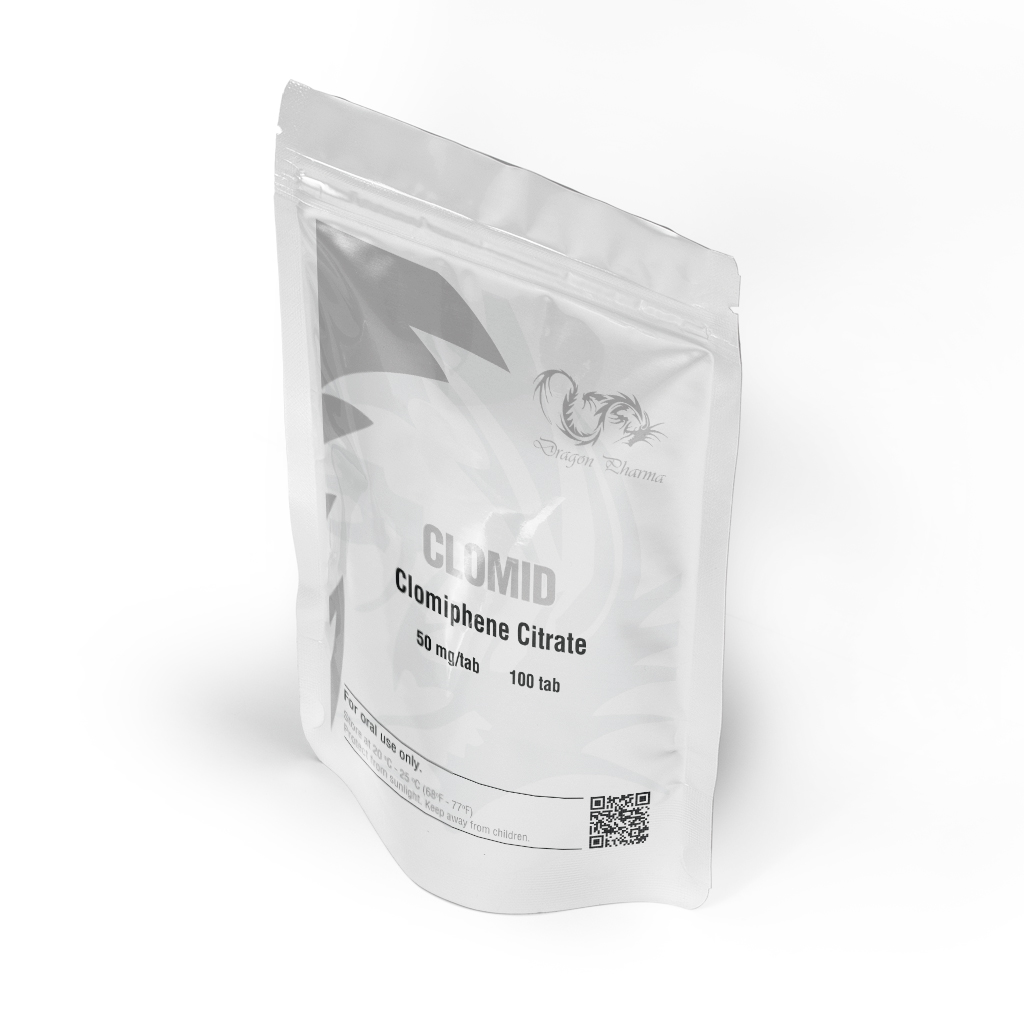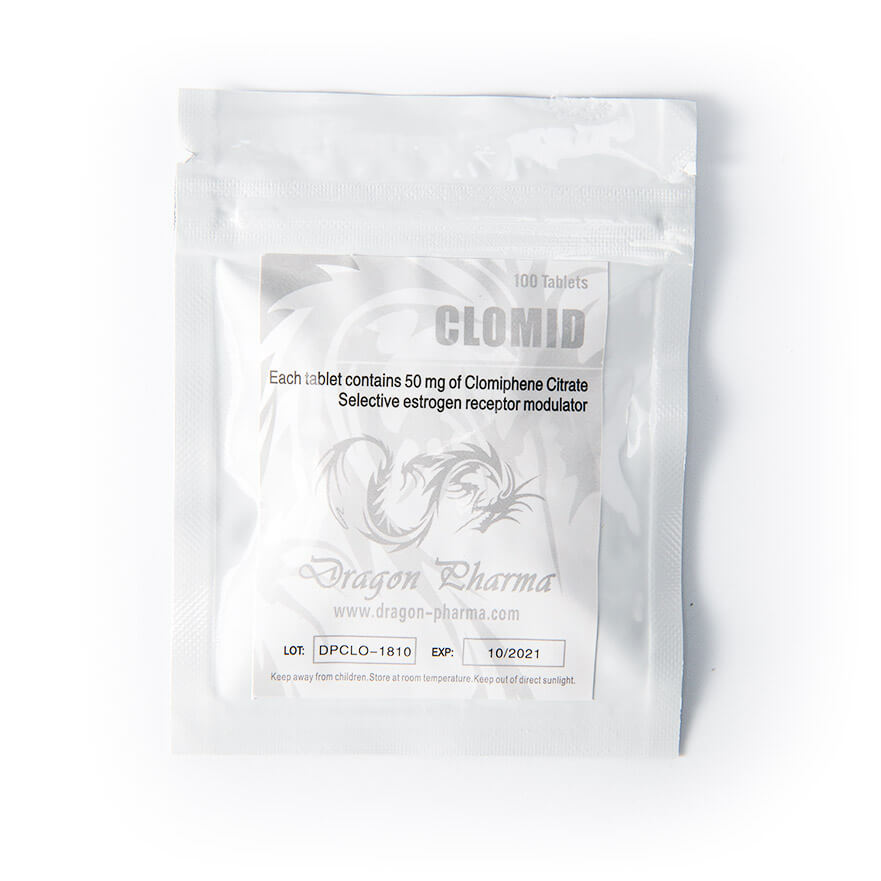CLOMID DP
$75.00 Original price was: $75.00.$70.00Current price is: $70.00.
Package: 100 tabs (50mg/tab)
Active Substance: Clomiphene Citrate
Clomid, also known by its generic name Clomiphene, is an oral medication produced by Dragon Pharma. This guide covers all aspects of Clomid, including its indications, contraindications, administration, medical action, precautions, side effects, overdosage, and conclusion. Clomid is widely used in Post Cycle Therapy (PCT) to help restore natural testosterone production in men after a cycle of anabolic steroids.
Indication
Clomid is primarily indicated for the treatment of ovulatory dysfunction in women who wish to become pregnant. It is used to stimulate ovulation by blocking estrogen receptors in the hypothalamus, leading to an increase in follicle-stimulating hormone (FSH) and luteinizing hormone (LH) levels, which in turn stimulate the ovaries to produce eggs.
In men, Clomid is used off-label to treat hypogonadism, a condition characterized by low testosterone levels. It works by increasing the production of FSH and LH, which stimulate the testes to produce more testosterone.
One of the most common uses of Clomid in men is during PCT after a cycle of anabolic steroids. When anabolic steroids are used, natural testosterone production is suppressed, and Clomid can help restore normal testosterone levels.
Contra-indications
While Clomid offers significant benefits, it is not suitable for everyone. Several contraindications should be considered before using this drug:
- Pregnancy: Clomid should not be used during pregnancy, as it can cause birth defects.
- Liver Disease: Individuals with severe liver disease should avoid Clomid, as it is metabolized by the liver.
- Ovarian Cysts: Clomid should not be used in women with ovarian cysts, as it can cause them to enlarge.
- Abnormal Uterine Bleeding: Clomid should not be used in women with abnormal uterine bleeding of unknown origin.
Patients with a history of thrombophlebitis (blood clots), mental depression, or allergic reactions to Clomid or any of its components should also avoid using this medication.
Administration
Clomid is typically taken orally in tablet form. For the treatment of ovulatory dysfunction in women, the usual starting dose is 50 mg daily for five days, starting on the fifth day of the menstrual cycle. If ovulation does not occur at this dose, it can be increased to 100 mg daily for five days.
In men undergoing PCT, the typical dose of Clomid is 50 mg daily for two to four weeks. This helps stimulate the production of FSH and LH, which in turn stimulates the testes to produce testosterone.
Medical Action
Clomid is a selective estrogen receptor modulator (SERM). It works by blocking estrogen receptors in the hypothalamus, which leads to an increase in FSH and LH levels. This stimulates the ovaries to produce eggs in women and the testes to produce testosterone in men.
In women, Clomid’s ability to induce ovulation makes it an effective treatment for ovulatory dysfunction and infertility. In men, it can help restore natural testosterone production after a cycle of anabolic steroids.
Precautions
Before starting Clomid, it is essential to undergo a thorough medical evaluation. This includes a complete medical history and physical examination to assess reproductive health and overall health status. Regular monitoring is necessary to track progress and detect any adverse effects.
Patients should inform their healthcare provider of any pre-existing medical conditions, allergies, or medications they are taking to prevent potential drug interactions and complications. Clomid should be used cautiously in individuals with a history of thrombophlebitis, as it can increase the risk of blood clots.
Maintaining a healthy lifestyle, including a balanced diet and regular exercise, is crucial when using Clomid. Patients should also avoid alcohol consumption, as it can interfere with Clomid’s effectiveness.
Side Effects
Like any medication, Clomid can cause side effects. Common side effects include:
- Hot Flashes: Hot flashes are a common side effect, especially in women.
- Mood Swings: Clomid can cause mood swings or irritability in some individuals.
- Headache: Headaches are another common complaint, often due to hormonal changes.
- Nausea: Some users may experience nausea or stomach discomfort.
Less common but more serious side effects include:
- Visual Disturbances: Clomid can cause visual disturbances such as blurred vision or spots in front of the eyes.
- Ovarian Hyperstimulation Syndrome (OHSS): In rare cases, Clomid can lead to OHSS, a condition characterized by enlarged ovaries and fluid retention.
- Multiple Pregnancies: Clomid increases the risk of multiple pregnancies, such as twins or triplets.
If any severe side effects occur, it is crucial to seek medical attention immediately. Adjusting the dosage or discontinuing the use of Clomid may be necessary to mitigate adverse effects.
Overdosage
An overdose of Clomid can lead to severe health complications. Symptoms of overdose may include nausea, vomiting, abdominal pain, and visual disturbances. In extreme cases, an overdose can cause ovarian hyperstimulation syndrome (OHSS), which requires immediate medical attention.
If an overdose is suspected, it is essential to seek emergency medical assistance. Treatment typically involves supportive care and monitoring of vital signs. In some cases, medications may be administered to counteract the effects of excess Clomid.
Conclusion
Clomid from Dragon Pharma is a potent oral medication that offers significant benefits for treating ovulatory dysfunction in women and hypogonadism in men. Its ability to stimulate ovulation and increase testosterone production makes it a valuable tool in reproductive medicine and PCT after anabolic steroid use.
However, it is crucial to use Clomid responsibly and under the guidance of a healthcare provider. Regular monitoring and adherence to recommended dosages help to minimize the risk of side effects and ensure optimal results. With proper use, Clomid can be an effective solution for restoring fertility and testosterone levels.
By understanding the indications, contraindications, administration, medical action, precautions, side effects, and potential for overdosage, users can make informed decisions about using Clomid. This comprehensive approach ensures that the benefits are maximized while minimizing the risks associated with this potent medication.
Clomid’s impressive ability to restore reproductive health and hormone balance makes it a popular choice among those seeking to improve their fertility and overall well-being. As with any potent drug, responsible use and thorough understanding of its effects are essential to achieving the best possible outcomes.
Popular Brands
Popular Categories
-

Winstrol/Stanozolol10 Products
-

Turanabol/4-Chlorodehydromethyltestosterone7 Products
-

Trenbolone Mix8 Products
-

Trenbolone Enanthate9 Products
-

Trenbolone Acetate7 Products
-

Testosterone Propionate8 Products
-

Testosterone Mix14 Products
-

Testosterone Enanthate8 Products
-

Testosterone Cypionate7 Products
-

Primobolan7 Products
-

Parabolan9 Products
-

Oral Steroids48 Products
-

Nandrolone Phenylpropionate7 Products
-

Nandrolone Decanoate6 Products
-

Injectable Steroids137 Products
-

Injectable Mix11 Products
-

Drostanolone Propionate7 Products
-

Drostanolone Enanthate8 Products
-

Dianabol/Methandienone9 Products
-

Boldenone Equipoise9 Products
-

Anavar/Oxandrolone10 Products
-

Anadrol/Oxymetholone5 Products












Reviews
There are no reviews yet.